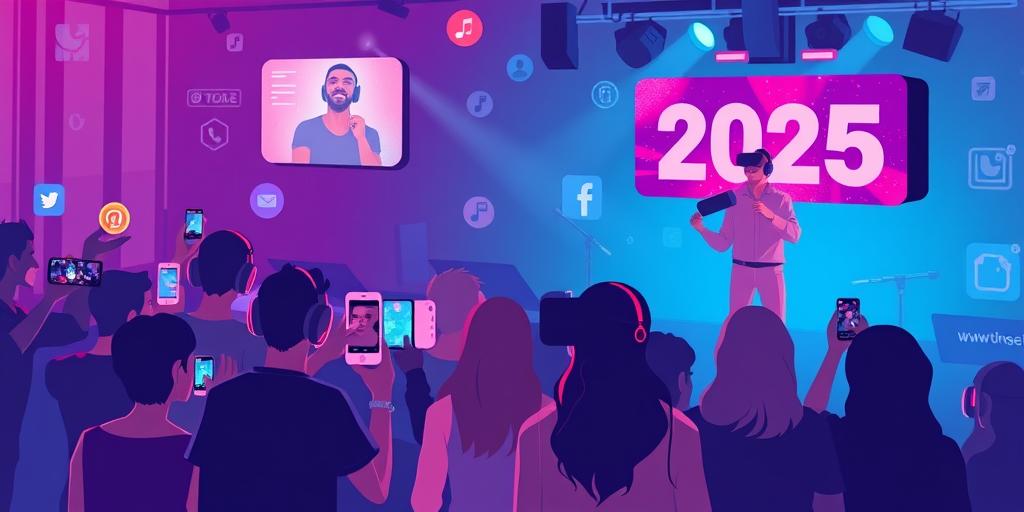Artist-Fan Engagement in the Digital Age (2025)
The relationship between artists and their fans has undergone a dramatic transformation in the digital age. As we move into 2025, this evolution continues, driven by technological advancements, shifting consumer behaviors, and the imperative for artists to connect authentically with their audiences. This article explores the key trends, strategies, and platforms shaping artist-fan engagement in the current landscape.
The Rise of Personalized Experiences
Personalization is no longer a buzzword; it’s an expectation. Fans crave experiences tailored to their individual preferences. Artists are leveraging data analytics to understand their audience better, offering customized content, merchandise, and interactions. This includes:
- Targeted Content: Creating content that resonates with specific segments of the fanbase, based on their musical tastes, geographic location, or engagement history.
- Exclusive Access: Offering early access to tickets, behind-the-scenes content, and exclusive merchandise for loyal fans.
- Interactive Experiences: Hosting personalized Q&A sessions, virtual meet-and-greets, and collaborative projects that involve fan participation.
The Power of Social Media and Emerging Platforms
Social media remains a crucial tool for artist-fan engagement. However, the landscape is constantly evolving. Artists are diversifying their presence across multiple platforms to reach different audiences and experiment with new forms of content. Emerging platforms like TikTok, Twitch, and Discord are gaining prominence, offering unique opportunities for artists to connect with fans in real-time and build vibrant communities.
- TikTok: Short-form video content continues to dominate, with artists using creative challenges, behind-the-scenes glimpses, and collaborations to engage fans.
- Twitch: Live streaming platforms provide a space for artists to interact directly with fans through live performances, Q&A sessions, and gaming streams.
- Discord: Community-building platforms allow artists to create dedicated spaces for fans to connect, share their passion, and participate in exclusive activities.
The Role of Blockchain and NFTs
Blockchain technology and non-fungible tokens (NFTs) are revolutionizing the way artists monetize their work and engage with fans. NFTs offer unique digital collectibles, access passes, and experiences that create a deeper connection between artists and their supporters. They also provide artists with greater control over their intellectual property and revenue streams.
- NFT Collectibles: Limited-edition digital art, music, and memorabilia that fans can collect and trade.
- Access Tokens: NFTs that grant holders exclusive access to concerts, events, and online communities.
- Revenue Sharing: Smart contracts that automatically distribute royalties to artists and fans who contribute to the creation and promotion of their work.
The Importance of Authenticity and Transparency
In an increasingly saturated digital landscape, authenticity and transparency are paramount. Fans are more likely to engage with artists who are genuine, relatable, and open about their creative process. This includes:
- Sharing Personal Stories: Artists who share their personal experiences, struggles, and triumphs create a deeper connection with their fans.
- Engaging in Open Dialogue: Responding to fan comments, answering questions, and soliciting feedback fosters a sense of community and collaboration.
- Being Transparent About Monetization: Clearly communicating how artists are using digital platforms to generate revenue builds trust and encourages fan support.
Challenges and Opportunities
While the digital age offers unprecedented opportunities for artist-fan engagement, it also presents challenges. Artists must navigate the complexities of social media algorithms, protect their intellectual property, and manage the demands of constant online presence. However, by embracing innovation, prioritizing authenticity, and focusing on building genuine relationships with their fans, artists can thrive in this dynamic environment.
Conclusion
As we move further into the digital age, artist-fan engagement will continue to evolve. The key to success lies in embracing new technologies, prioritizing personalization, and fostering authentic connections with audiences. By understanding the trends and adapting their strategies, artists can build thriving communities and create meaningful experiences that resonate with fans for years to come.
